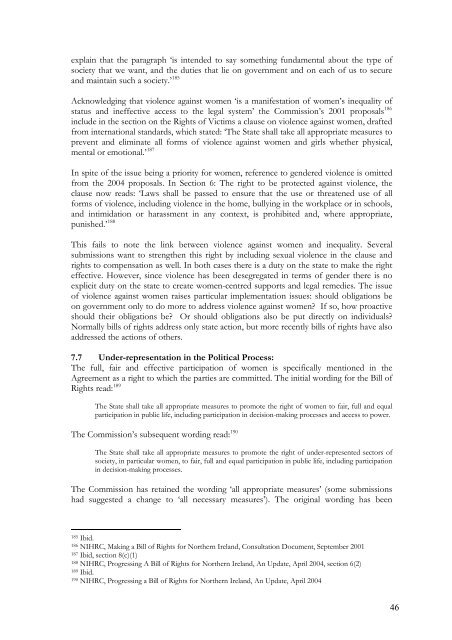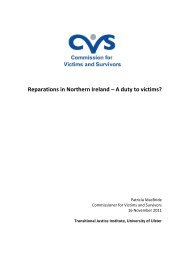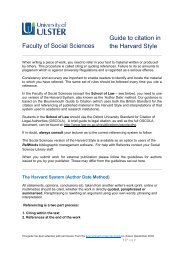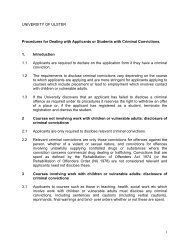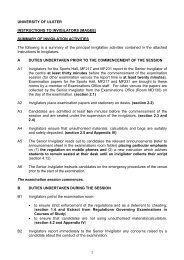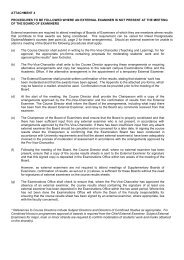Agreement Reached in the Multi-Party Negotiations - Transitional ...
Agreement Reached in the Multi-Party Negotiations - Transitional ...
Agreement Reached in the Multi-Party Negotiations - Transitional ...
You also want an ePaper? Increase the reach of your titles
YUMPU automatically turns print PDFs into web optimized ePapers that Google loves.
expla<strong>in</strong> that <strong>the</strong> paragraph ‘is <strong>in</strong>tended to say someth<strong>in</strong>g fundamental about <strong>the</strong> type of<br />
society that we want, and <strong>the</strong> duties that lie on government and on each of us to secure<br />
and ma<strong>in</strong>ta<strong>in</strong> such a society.’ 185<br />
Acknowledg<strong>in</strong>g that violence aga<strong>in</strong>st women ‘is a manifestation of women’s <strong>in</strong>equality of<br />
status and <strong>in</strong>effective access to <strong>the</strong> legal system’ <strong>the</strong> Commission’s 2001 proposals 186<br />
<strong>in</strong>clude <strong>in</strong> <strong>the</strong> section on <strong>the</strong> Rights of Victims a clause on violence aga<strong>in</strong>st women, drafted<br />
from <strong>in</strong>ternational standards, which stated: ‘The State shall take all appropriate measures to<br />
prevent and elim<strong>in</strong>ate all forms of violence aga<strong>in</strong>st women and girls whe<strong>the</strong>r physical,<br />
mental or emotional.’ 187<br />
In spite of <strong>the</strong> issue be<strong>in</strong>g a priority for women, reference to gendered violence is omitted<br />
from <strong>the</strong> 2004 proposals. In Section 6: The right to be protected aga<strong>in</strong>st violence, <strong>the</strong><br />
clause now reads: ‘Laws shall be passed to ensure that <strong>the</strong> use or threatened use of all<br />
forms of violence, <strong>in</strong>clud<strong>in</strong>g violence <strong>in</strong> <strong>the</strong> home, bully<strong>in</strong>g <strong>in</strong> <strong>the</strong> workplace or <strong>in</strong> schools,<br />
and <strong>in</strong>timidation or harassment <strong>in</strong> any context, is prohibited and, where appropriate,<br />
punished.’ 188<br />
This fails to note <strong>the</strong> l<strong>in</strong>k between violence aga<strong>in</strong>st women and <strong>in</strong>equality. Several<br />
submissions want to streng<strong>the</strong>n this right by <strong>in</strong>clud<strong>in</strong>g sexual violence <strong>in</strong> <strong>the</strong> clause and<br />
rights to compensation as well. In both cases <strong>the</strong>re is a duty on <strong>the</strong> state to make <strong>the</strong> right<br />
effective. However, s<strong>in</strong>ce violence has been desegregated <strong>in</strong> terms of gender <strong>the</strong>re is no<br />
explicit duty on <strong>the</strong> state to create women-centred supports and legal remedies. The issue<br />
of violence aga<strong>in</strong>st women raises particular implementation issues: should obligations be<br />
on government only to do more to address violence aga<strong>in</strong>st women? If so, how proactive<br />
should <strong>the</strong>ir obligations be? Or should obligations also be put directly on <strong>in</strong>dividuals?<br />
Normally bills of rights address only state action, but more recently bills of rights have also<br />
addressed <strong>the</strong> actions of o<strong>the</strong>rs.<br />
7.7 Under-representation <strong>in</strong> <strong>the</strong> Political Process:<br />
The full, fair and effective participation of women is specifically mentioned <strong>in</strong> <strong>the</strong><br />
<strong>Agreement</strong> as a right to which <strong>the</strong> parties are committed. The <strong>in</strong>itial word<strong>in</strong>g for <strong>the</strong> Bill of<br />
Rights read: 189<br />
The State shall take all appropriate measures to promote <strong>the</strong> right of women to fair, full and equal<br />
participation <strong>in</strong> public life, <strong>in</strong>clud<strong>in</strong>g participation <strong>in</strong> decision-mak<strong>in</strong>g processes and access to power.<br />
The Commission’s subsequent word<strong>in</strong>g read: 190<br />
The State shall take all appropriate measures to promote <strong>the</strong> right of under-represented sectors of<br />
society, <strong>in</strong> particular women, to fair, full and equal participation <strong>in</strong> public life, <strong>in</strong>clud<strong>in</strong>g participation<br />
<strong>in</strong> decision-mak<strong>in</strong>g processes.<br />
The Commission has reta<strong>in</strong>ed <strong>the</strong> word<strong>in</strong>g ‘all appropriate measures’ (some submissions<br />
had suggested a change to ‘all necessary measures’). The orig<strong>in</strong>al word<strong>in</strong>g has been<br />
185 Ibid.<br />
186 NIHRC, Mak<strong>in</strong>g a Bill of Rights for Nor<strong>the</strong>rn Ireland, Consultation Document, September 2001<br />
187 Ibid, section 8(c)(1)<br />
188 NIHRC, Progress<strong>in</strong>g A Bill of Rights for Nor<strong>the</strong>rn Ireland, An Update, April 2004, section 6(2)<br />
189 Ibid.<br />
190 NIHRC, Progress<strong>in</strong>g a Bill of Rights for Nor<strong>the</strong>rn Ireland, An Update, April 2004<br />
46


